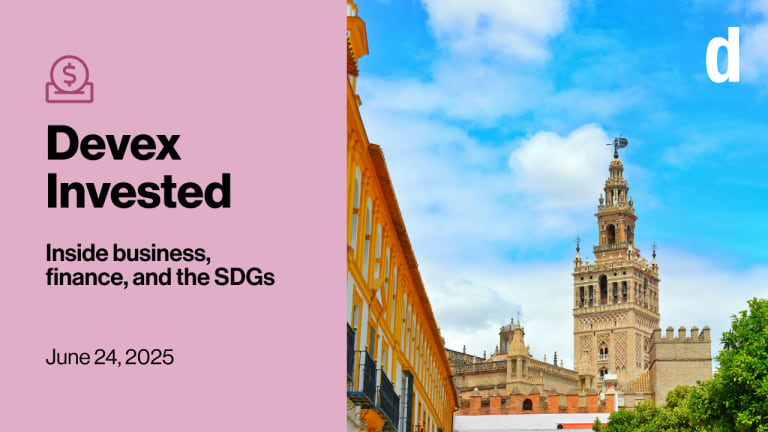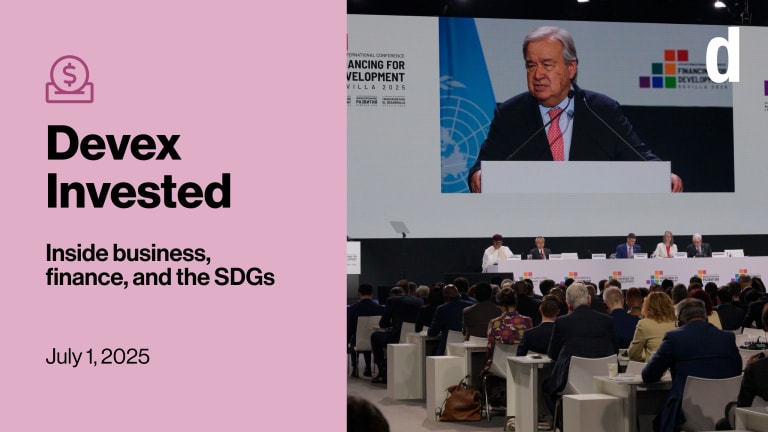Opinion: How to ensure you’re heard at COP 28 and beyond
Here is a list of tips to set leaders up to be heard at crowded global development events such as COP 28, from professional speechwriters Kate Childs Graham and Vinca LaFleur.
This month, leaders will convene in Dubai, the United Arab Emirates, for the 2023 United Nations Climate Change Conference, better known as COP 28. Elected officials will reaffirm old commitments and announce new ones. Corporate executives will discuss the opportunities the climate crisis presents, and how to seize them. Activists will argue for solutions to protect those most affected by a warming world. In other words, a lot will be said at COP 28. But only so much will be heard. As professional speechwriters, we’ve helped public, private, and nonprofit executives address global gatherings from the United Nations to Davos. To lead a crowded conversation at a crowded event, here are some tips to keep in mind. 1. Study the terrain, and stake out your ground To drive a discussion, you first need to know where it has been, where it is now, and where it’s headed. What are your collaborators, competitors, champions, and critics saying? What’s missing from the conversation? What can you say that no one else is saying? Or, how can you say something that will make listeners respond, “I never thought about it that way before”? So start with what we call a “read file” on the event and issue at hand — a research document with everything from media articles to analytical reports, speeches (including from peers and partners), and more. Survey the landscape, see the recurring themes, and stake out promising points of entry, because as a speaker, it’s not enough to have a compelling message; you need to be positioned to break through. 2. Forget the forest, focus on the trees Sometimes, we find that issue experts are so “in it” that when they address a general audience, they forget to explain why they’re in it — that is, why their work matters to them, their community, their country, and the world. We have to remind them that to be persuasive, they need to include the “why” behind the “what.” But at global gatherings, the opposite often holds. The whole event is convened around the “why.” COP 28 attendees are already bought into the cause, to one degree or 1.5 degrees Celsius. At big events such as COP 28, instead of using your limited time while speaking or networking to describe the forest everyone can see, draw attention to your work’s own specific “trees”: the innovation you’ve trademarked, the investment you’ve earmarked, the question nobody else is asking, the on-the-ground perspective nobody else can provide. 3. Cross-pollinate If you don’t have something different to say, try finding someone different to say it with. Unlikely partners can make a familiar storyline seem fresh — which may help explain why the president of COP 28 is Sultan Ahmed Al Jaber, an oil executive. In 2017, the island nation of Fiji, which is literally on the front lines of climate change, partnered with Bonn, Germany, home to one of Europe’s largest coal mines, for COP 23. And in 2015, representatives from more than 600 cities joined together for the inaugural “Climate Summit for Local Leaders.” At a time when so much of the public debate is characterized by division, seeing leaders from different settings, different sectors, or different sides of an issue speaking together can spark people’s interest. And if those leaders actually find common ground, it neutralizes the need for counterargument. 4. Make a sound, whether or not anyone is around If the past is prelude, there will be more than 120 speakers, 70 panel discussions and countless side events at COP 28. Even the biggest speeches from the biggest names will only get a passing mention in the print coverage, or perhaps a brief clip on TV. Last year, U.S. President Joe Biden’s remarks received little more than cursory coverage from the major news outlets on the day of his speech. To avoid your message getting lost in the mix, build an audience beyond the event itself. Share your ideas on social media, as Kenyan President William Ruto has done in recent weeks, touting the Nairobi Declaration on X, formerly Twitter. Pen an opinion piece that advances your idea to a broader audience, as a group of world leaders, including Al Jaber, Ruto, and Barbados’ Mia Mottley, did in Politico back in September. Preview your idea as an exclusive to a single journalist, and share the resulting article with key stakeholders. Or circulate your idea, via letter or Substack, to those same stakeholders, as BlackRock CEO Larry Fink did in his 2020 letter to CEOs on climate finance. But remember: Ultimately, it’s the idea itself that will earn attention — or not. No matter the communications strategy, it’s an idea’s power that precipitates a leader’s power to lead, and inspires others to take the hard steps necessary for change.
This month, leaders will convene in Dubai, the United Arab Emirates, for the 2023 United Nations Climate Change Conference, better known as COP 28. Elected officials will reaffirm old commitments and announce new ones. Corporate executives will discuss the opportunities the climate crisis presents, and how to seize them. Activists will argue for solutions to protect those most affected by a warming world.
In other words, a lot will be said at COP 28. But only so much will be heard.
As professional speechwriters, we’ve helped public, private, and nonprofit executives address global gatherings from the United Nations to Davos. To lead a crowded conversation at a crowded event, here are some tips to keep in mind.
This story is forDevex Promembers
Unlock this story now with a 15-day free trial of Devex Pro.
With a Devex Pro subscription you'll get access to deeper analysis and exclusive insights from our reporters and analysts.
Start my free trialRequest a group subscription Printing articles to share with others is a breach of our terms and conditions and copyright policy. Please use the sharing options on the left side of the article. Devex Pro members may share up to 10 articles per month using the Pro share tool ( ).
The views in this opinion piece do not necessarily reflect Devex's editorial views.
Kate Childs Graham is a co-executive director at West Wing Writers, a speechwriting and strategy firm based in Washington, D.C. Previously, she served as director of speechwriting for U.S. Vice President Kamala Harris.
Vinca LaFleur is a co-executive director at West Wing Writers, a speechwriting and strategy firm based in Washington, D.C. LaFleur has served as a foreign policy speechwriter for former U.S. President Bill Clinton.





